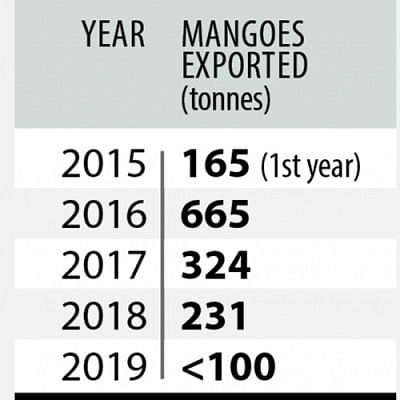Mango export drops 85pc since 2016

Mango exports have declined by around 85 percent since 2016 due to negligence of a section of agricultural officials and exporters' violation of rules of good agricultural practices for greater profits.
Many importing countries recommend good agricultural practices that ensure the fruits are produced, packed, handled, and stored safely to minimise risks of food safety hazards.
Under these practices, the Department of Agricultural Extension (DAE) advocates exporters to select contract farmers ahead of the mango season. These contract farmers would then follow prescribed methods of cultivation and produce the best quality of safe, organically grown mangoes for export.
The exporters would then buy these mangoes from the contract farmers, complete procedures for packaging, testing by the DAE's Plant Quarantine Wing, and prepare for export.
But two years after the country began mango exports in 2015, exporters began to ignore the contract farmers and buy mangoes randomly from local markets.
These mangoes were also certified by the DAE's Plant Quarantine Wing, which among other duties inspects and regulates the export of plants and plant products according to the requirements of importing countries, as maintaining good agricultural practices.
However, on reaching the destination countries, especially in the US and in Europe, most of the mangoes that were bought from local markets were found to be infected with pests. These were accordingly rejected and then destroyed.
As the rate of rejection rose, the demand for the Bangladeshi fruit continued to fall in the importing countries, DAE officials and farmers said.
Rabiul Islam, a mango producer of Kansat in Chapainawabganj, said, "We survived the losses from producing safe export-quality mangoes because the demand for safe mangoes has luckily increased in local markets. Local buyers are also choosing our mangoes. If we had to depend only on export, we would have had to suffer much more losses."
According to DAE officials, none of the contract farmers in Rajshahi got any opportunity to sell mangoes for export this year, and only one farmer of Chapainawabganj managed to sell some 10 tonnes to exporters.
"When we go for producing export-quality mangoes, our expenditure goes up,'' said Ismail Khan, general secretary of Shibganj Safe Mango Producers' Association, an organisation of 200 mango producers.
Ismail said he provided some 10 tonnes of Amrapali variety of mangoes to exporters this year.
"If we harvest three tonnes of mangoes from an orchard, we hardly get one tonne of quality mangoes for export. So, the price of export-quality mangoes rises," he told this correspondent.
Contract farmers were trained to produce sufficient quantities of safe mangoes following good agricultural practices -- that include using the prescribed quantity of pesticides and insecticides, using the fruit-bagging method of cultivation, and harvesting the fruit by engaging skilled labourers -- both farmers and DAE officials mentioned.
As per these rules, exporters have to ensure compliance with the "good agricultural practices" beginning from cultivation to packaging the mangoes, said Md Fazlul Haque, additional director of DAE's Plant Quarantine Wing.
But while exporting, businessmen prefer buying mangoes from local markets, ignoring contract farmers to avoid paying them a "good price".
"Buying the best quality mangoes for export requires paying the contract farmers well. But what happened in the last few years is that some businessmen avoided paying the farmers -- instead they bought mangoes from the markets at lower prices and managed the test results in their favour," said the DAE official.
Most of the mangoes were found to be pest-infected and were eventually rejected in destination countries, especially in Europe, resulting in poor exports these last few years, he noted.
The country produces around 12 lakh tonnes of mangoes a year and can export at least 10 percent of the fruit without having any impact on local demand, said a mango researcher at Bangladesh Agriculture Research Institute.
When farmers first began producing safe mangoes following a Chinese method of using fruit bags in mango trees (to combat fruit flies) in 2015, the potential of mango exports came to light.
For the first time, 165 tonnes of mangoes were sent to Europe and the Middle East that year. Of this, only 10 tonnes were from Rajshahi and Chapainawabganj districts with the rest from southern districts, according to the DAE.
Next year saw the highest export of mangoes till date -- 665 tonnes -- of which 90 percent were from Rajshahi and Chapainawabganj, the major mango-producing districts in the country.
Inspired by the 2016 export, the farmers of Rajshahi region produced some two crore safe mangoes with an export target of 5,000 tonnes in 2017. But they managed to sell only 2.8 tonnes to exporters that year.
Most of the 324 tonnes of mangoes exported in 2017 were bought from markets and not from the contract farmers, DAE officials and farmers confirmed.
In 2018, most contract farmers were once again unable to sell their produce to exporters and only 231 tonnes of mangoes were exported that year.
Last year, mango exports fell to below 100 tonnes -- an 85 percent decline since 2016.
The loss suffered by farmers in 2017 prompted the region's Agro Food Producers' Society Convenor Anwarul Hoque to file a complaint with the Prime Minister's Office on July 10 that year.
In the complaint, Anwarul stated that some officials of the DAE's Plant Quarantine Wing were biased to insecticide-using producers, and they certified "non-organic" mangoes for export resulting in losses to the organic mango farmers.
A three-member committee headed by Mohammad Mahfuzul Haque, chairman of Bangladesh Food Safety Authority, probed Anwarul's allegations.
While the probe report, signed on November 1, 2017, could not find evidence of DAE's backing for insecticide-using producers, it found "neglect and apathy" of officials to organic mangoes and recommended promotion of safe mangoes.
It also detected a lack of coordination among farmers of safe mangoes, exporters, and DAE's quarantine wing officials.
But farmers of safe mangoes say the probe report's recommendations were never implemented and they witnessed repetitions of the 2017 situation in the following years and a sustained fall in exports.
Mango exporter Md Shahabuddin of Feni said all exporters are not the same and reputed exporters do not flout rules when buying mangoes for export.
"Dishonest exporters in league with dishonest officials are exporting low quality mangoes for profit. Their malpractice is hurting our reputation."
He points out that agricultural officials have to certify when exporters buy mangoes from a garden and they also test the mangoes and certify after exporters take those to a quarantine station.
"You see, officials are involved in two phases and still their certified mangoes are being rejected abroad."
Usually, exporters pay around Tk 20 per kg, and sometimes as much as Tk 40, higher than the market price for mangoes, when they buy from contract farmers. The price goes further up if farmers incur higher costs for production, he said.
Many exporters want to avoid this extra expenditure, saying they compete with Indian and Pakistani exporters in foreign markets, he also said.
The exporter observed there are large market possibilities for Bangladeshi mangoes in European, Middle-Eastern, and Asian countries.
"Yet, we cannot explore this potential for those dishonest people and due to lack of a standard policy for mango exports."
This year during peak mango season, exports were hit hard by lockdowns and travel restrictions across the globe due to the coronavirus pandemic.
Only late in the mango season did exporters become active and start procuring mangoes for export. An agro farm sent a sample consignment to Switzerland on July 12.
DAE's Fazlul Haque said the government is considering setting up quarantine stations in Rajshahi and some other regions to end safe mango farmers' woes.
"One of our projects to set up such stations is awaiting approval," he said, adding that the field-level stations would help exporters source local mangoes.
At present, exporters have to take mangoes to Narayanganj for testing.

 For all latest news, follow The Daily Star's Google News channel.
For all latest news, follow The Daily Star's Google News channel. 



Comments